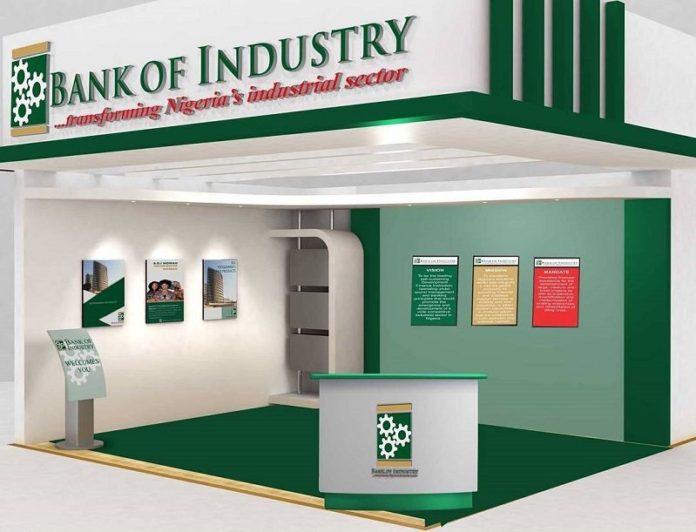The Bank of Industry (BOI) is a development finance institution (DFI). The BOI is the oldest and largest financing institution dedicated to business development in Nigeria. It succeeded the Nigerian Industrial Development Bank (NIDB), which was first founded in 1964. It was recapitalised and reformed in 2001, becoming the Bank of Industry.
The BOI works in collaboration with some partner institutions such as the Federal Ministry of Industry, Small and Medium Enterprises Development Agency of Nigeria (SMEDAN), the Federal Ministry of Finance, Trade and Investment, the Central Bank of Nigeria (CBN) and a host other public/private sector organisations. Also, BOI sits with other DFIs such as the Bank of Agriculture (BOA) and the Development Bank of Nigeria (DBN).
Also Read: How to Grow Your Business With Renmoney
The main aim of the Bank of Industry is to give long term funding to businesses in the Nigerian industrial sector. It focuses on providing credit to micro, small and medium enterprises (SMEs) and even bigger corporations. Newer companies may get this loan facility, just as it may also be given to existing businesses to diversify, expand, and modernise.
Currently, the Bank of Industry has four subsidiaries including:
- BOI Microfinance Bank
- BOI Investment and Trust Company Limited
- Leasing Company of Nigeria (LECON)
- BOI Industrial and Development Insurance Brokers
Contents
Bank of Industry loan and funding types
Different types of funding are available from the Bank of Industry. Some of the options available include secured loans, asset financing, working capital loans, among others.
Businesses from a variety of industries can access these funds through the BOI. It focuses mainly on agriculture, information communication technology, agro-processing, oil and gas, the creative sector and solid minerals sectors.
In addition to offering competitive rates and relatively long repayment terms, the program provides other support incentives. Loans typically have terms of one to five years (plus). Loans are usually structured in a way that allows for borrowers to enjoy a moratorium period or incubation period during which they are not required to repay.
BOI Products include:
- ASM Fund
- Fashion and Beauty Product
- Bottom of Pyramid
- Food and Agro Commodity Processing
- Light Manufacturing
- Nollyfund
- Graduate Entrepreneurship Fund
- Solar Energy
- On-Lending to Commercial Banks
- Youth Ignite Program
- Youth Entrepreneurship Support (Yes) Program
Also Read: 3 things to know before you take in investors
BOI managed funds
Also known as intervention funds, managed funds are monies the federal government, private institutions or individuals set aside to cater for a particular interest or intervene in a specific sector.
Many attractive features are included with these funds, including low or no interest rates, longer tenors and moratoriums, among others.
The Bank of Industry manages a number of these funds directly under several different schemes. In other words, the bank of industry manages the disbursement, implementation, monitoring, and recovery of these funds.
Managed funds include:
- BOI/CBN Intervention Fund
- Cement Fund
- Cassava Bread Fund
- FGN Special Intervention Fund for MSME (NEDEP)
- Cottage Fund
- National Program on Food Security (NPFS)
- NADDC Fund
- Sugar Development Council Fund
- Rice and Cassava Intervention Fund
Therefore, if you have businesses that fall under any of the listed categories, then you should reach out to the bank of industry. Read on to see how you can apply for funds or loans are the bank of industry.
BOI matching funds
Matching funds aim to provide SMEs and larger businesses with increased funding opportunities. These specialized funds are meant to drive economic growth, industrial development, and sustainable development in Nigeria.
Through matching funds, the Bank of Industry works in collaboration with different partner institutions such as wealthy individuals, multilateral organizations and state governments.
Matching funds include:
- BOI/Dangote Foundation Matching Funds
- BOI/State Matching Funds
How to qualify for a bank of industry loan
The number one requirement for a bank of industry loan is that your business must be registered with the Corporate Affairs Commission (CAC). It is therefore essential to have a registration number for a Business Name or a Limited Liability Company.
Priority is given to companies in the following sectors:
- Agro-allied, textiles and leather
- Solid minerals
- Polymer-based (wood, plastic, cotton, rubber etc.)
- Information communication technology (ICT)
- Foundries
You must also meet at least one of the following general lending criteria:
- Ability to contribute to Nigeria’s industrial production
- Materials primarily sourced from domestic sources
- The industries where Nigeria’s comparative advantage can be leveraged for competitiveness
- Capacity to expand exports worldwide
- Manufacturing high-quality products for domestic consumption
- Initiatives that promote interstate or regional cooperation
- Integrated projects that can operate within existing supply chains
- Developing technologies that will be commercially successful and technically feasible
- Businesses that can employ a large number of people
- Well-run companies with sound accounting and bookkeeping practices
- Environment-friendly green projects
- Women-led businesses
How to apply for a Bank of Industry loan
Applying for a Bank of Industry loan can be done online or in person. The BOI has regional offices throughout Nigeria.
Also Read: How to write a winning grant pitch or proposal
It is expected that you will have to complete a lengthy application process when applying for loan at the bank of industry. Loan requirements will vary from loan to loan. Additionally, the requirements differ according to the size of your business (micro, small or large enterprise) and how much money you are seeking.
As a result, you will need to present some standard documents, such as financial statements, collateral details, an overview of your company, and information about how you intend to use the money.
The following is a list of what you may need:
- Fill out the loan application form
- Memorandum and Articles of Association
- Incorporation certificate
- Feasibility study
- Business plan
- Raw material supply quotation
- Equipment and machinery supply quotations
- BVN (Bank Verification Number) and passport photos.
- Identification documents (passports, driving licenses, and permanent voters cards).
- Audited financial accounts
- Certificate of tax clearance
- Bank statements for a company
- Information about the security or collateral being offered
- Statement of current liabilities
- Contract of lease (if you are operating in a rented space)
Frequently asked questions about BOI
Which items can be financed by the Bank of Industry?
Among the main loans of BOI are for industrial equipment used in manufacturing. Land and buildings are not funded by the BOI. You may seek alternative funding solutions if you have additional working capital requirements.
Also Read: Why Did You Start That Business?
What is the process by which the Bank of Industry disburses loans?
If your loan application is successful, money will not be deposited directly into your bank account. Loans are instead advanced to the vendors and suppliers of the equipment being the money was loaned for.
What is my borrowing limit with the Bank of Industry?
The minimum amount you can borrow is 5 million Naira. Loan requests of up to 5 million Naira can be accommodated through the BOI matching fund platform and its Bottom of the Pyramid scheme (BOP).
Is collateral required by the Bank of Industry?
Yes, you need to pledge some assets as collateral with the Bank of Industry. However, collateral need not be physical assets; alternative forms of security are accepted, such as:
- A legal mortgage on property
- Guarantee from the bank
- Debentures secured by assets of a company
- Collateral from third parties
- Third-party or external guarantors
- Assets pledged previously to other lenders (as long as the BOI’s loan is adequately covered)
Can the Bank of Industry fund my startup?
The bank typically requires pre-existing companies with a track record to apply for a loan, but it does grant startup loans at its discretion. In order for the bank to consider financing a startup, they would need a sound business plan and proof of competence in the chosen industry.
What is the Bank of Industry’s interest rate?
The annual interest rate at the Bank of Industry is typically 9%. However, the exact finance products and schemes will determine whether this is lower or higher. Also, there may be other applicable charges such as appraisal fees, processing fees, and monitoring fees.
What is the term of Bank of Industry?
An average BOI loan term lasts 12 to 60 months. In addition, a moratorium of up to 12 months may also be offered, depending on the exact loan term.
The Bank of Industry approves loans in how long?
A loan will typically be processed in 30 to 40 working days as long as all the required documents are attached. For bigger loan requests, there will be a longer processing time.
Are there any types of businesses that the Bank of Industry supports?
Among the products the BOI supports are:
- 3D printing
- Animal feeds
- Aquaculture
- Bakery
- Blocks and interlocking stones
- Bottled water
- Ceramics and tiles
- Chemicals and paints
- Cosmetics and hair products
- Dairy
- Digital printing and multimedia publishing
- Doors and window frames
- E-commerce
- Fashion
- Fish smoking and drying
- Food processing
- Foundries and metal fabrication
- Fruit juice
- Furniture and wood processing
- Gemstones
- Greenhouses
- Grocery packaging
- Healthcare (medical diagnostics)
- Information and communications technology (ICT)
- Laundry and dry cleaning
- Leather
- Light manufacturing (lube blending, paper, paints etc.)
- Liquefied petroleum gas and compressed natural gas
- Meat processing
- Mechatronics
- Movie production (Nollywood)
- Plastics
- Quarries
- Recycling
- Restaurants
- Roofing sheets
- Shoemaking
- Soaps and detergents
- Solar (off-grid)
- Technical and vocational schools (offering city and guild certificate)
- Theme parks
- Water transportation
In Conclusion
If you are looking for capital to grow your existing business, the Bank of Industry is surely a good place. With this guide, you now know all about the requirements and procedures.
For other sources of funds and capital for small and medium businesses, especially if it’s new, check out this article How to Get Capital to Launch Your Business Ideas.
RELATED ARTICLES

























Good evening sir please i need help from you sir please how can i get a loan sir please sir i need a direct on how to get a loan from the company sir thank you sir God bless you